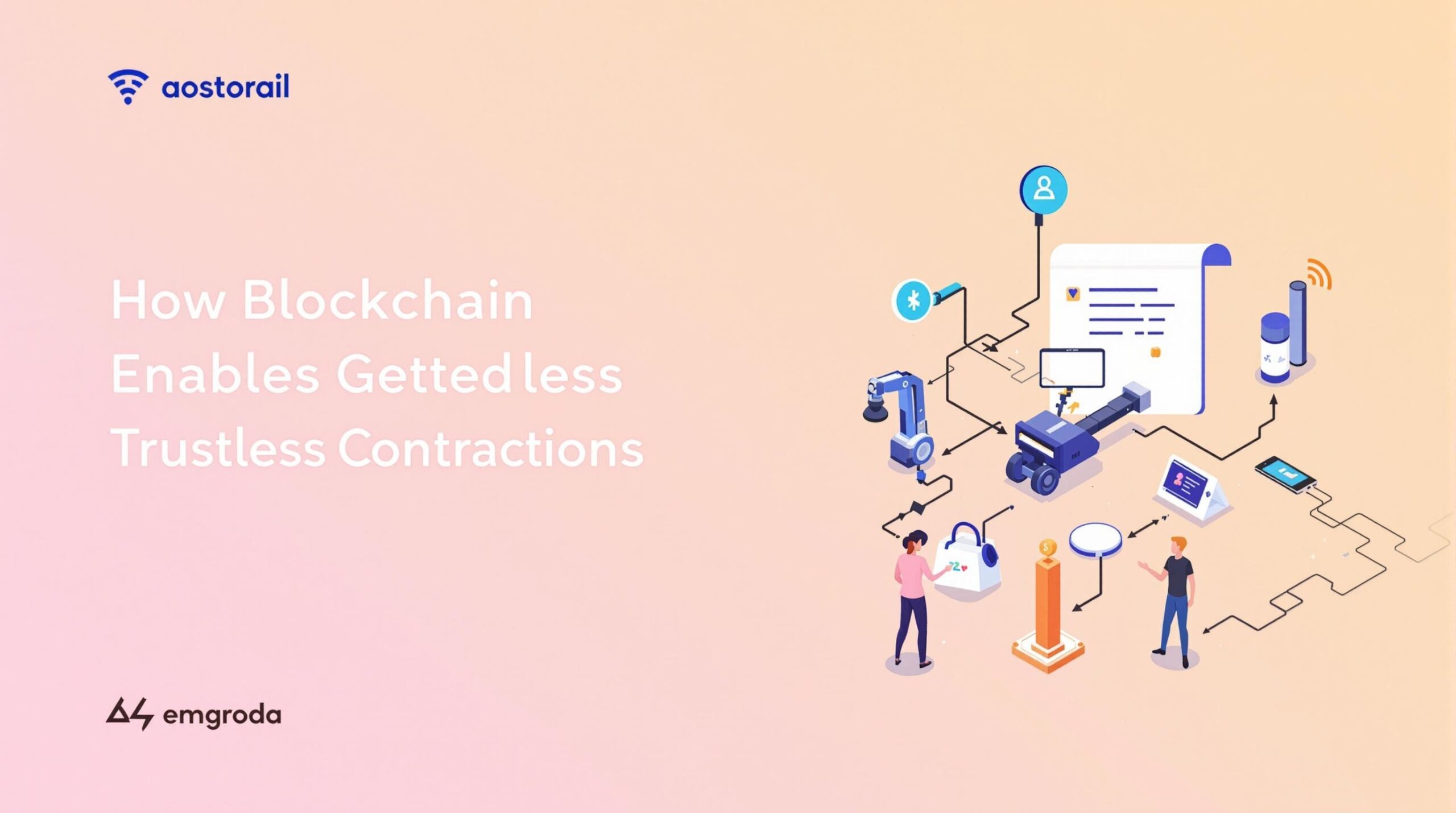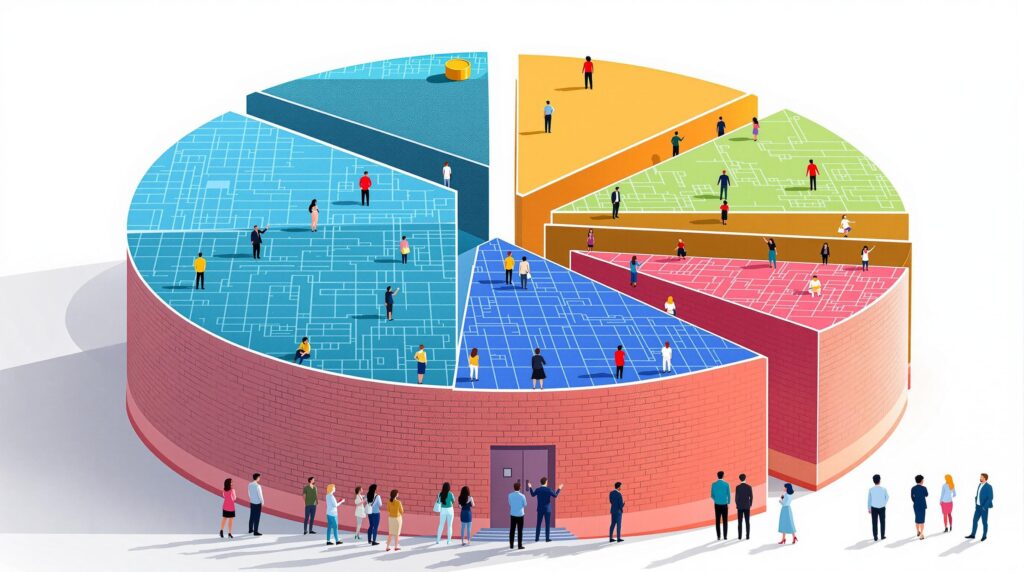The Impact of Smart Contracts on Automation
Imagine a world where business operations seamlessly execute without the need for human intervention. This is the power of smart contracts in automation. By leveraging blockchain technology, smart contracts eliminate the middleman, reducing both time and cost—a true game-changer for industries across Africa and beyond.
What is a smart contract? A smart contract is a self-executing contract where the terms are directly written into code, allowing transactions to execute automatically with minimal to no human intervention.
Traditionally, automating processes involved complex systems and multiple intermediaries. Every step required manual vetting, leading to inefficiencies and increased chances of errors. Now, with smart contracts, businesses can streamline these processes significantly. Let’s explore how.
- Eliminating Intermediaries: One of the most significant impacts of smart contracts is their ability to bypass traditional intermediaries such as banks and legal representatives. This isn’t merely a theory; platforms like traditional contracts vs. smart contracts already demonstrate practical applications.
- Reducing Manual Tasks: Smart contracts minimize manual oversight by automating agreements, whether financial or procedural. This reduction not only saves time but also cuts down on costs associated with error rectification.
- Enhancing Transparency: Because smart contracts operate on a blockchain, every action and its corresponding data point are logged and visible, fostering an environment of trust. This transparency is instrumental in sectors like supply chain management, where improved transparency leads to concrete efficiency improvements.
The ripple effects of this technology are particularly compelling when viewed through the lens of Jara’s initiatives in Africa. By investing in Jara, participants can tap into the continent’s burgeoning digital economy, which is projected to surpass $200 billion.
“The $JARA token offers not just an investment opportunity, but a means to actively participate in Africa’s digital asset revolution. It is a bridge between global capital and African innovations.”
With Africa’s digital transformation well underway, there’s a rising tide of demand for infrastructure that supports economic empowerment and financial inclusion. Smart contracts, especially through platforms like Jara’s use cases in Africa, are enabling the tokenization of real-world assets, making it easier for international investors to engage with the local market.
By leveraging a proprietary Layer 2 blockchain, Jara ensures low transaction fees and fast, secure transactions—crucial for the tokenization of infrastructure projects like Lagos airport. This empowerment of real-world asset tokenization not only democratizes access to African investments but also fortifies the ecosystem with robust, scalable technology.
- Decreased Errors: By automating routine tasks, smart contracts substantially lower the likelihood of human error, which is a critical factor in industries such as healthcare and finance where fraud reduction is paramount.
- Improved Scalability: As businesses grow, smart contracts enable enhanced scalability by automating logistics and operational processes, allowing companies to focus on high-value tasks instead of routine paperwork.
This transition to automation facilitated by smart contracts signifies a paradigm shift, particularly in emerging markets like Africa where infrastructure deficits are immense, and the need for scalable, transparent solutions is urgent. By bridging these gaps, smart contracts are not only transforming individual sectors but are also playing a pivotal role in the continent’s digital evolution.
Jara stands at the forefront of this revolution. Through strategic partnerships and a unique social-first approach, the company is well-positioned to lead Africa’s digital asset economy into new realms of capability and efficiency. This creates a robust foundation for smart contracts to shine as a catalyst for economic prosperity across the region.
Jara’s ecosystem, empowered by $JARA tokens, exemplifies the profound impact of smart contracts on automation. It’s not just about technology; it’s about transforming how we engage with and invest in Africa’s future.
Blockchain: The Backbone of Trustless Agreements
How Blockchain Technology Supports Smart Contracts
In the rapidly evolving digital world, blockchain technology plays a vital role as the foundation for smart contracts. But how exactly does blockchain ensure the secure and transparent execution of these contracts? Let’s delve into the mechanisms that make this possible.
Firstly, a blockchain serves as a decentralized ledger where each transaction, or step in a contract, is recorded in a block. These blocks are linked together in a chain that is immutable, meaning once a transaction is recorded, it cannot be altered. This immutability is a critical aspect that supports smart contracts, as it ensures that all parties involved have access to the same, tamper-proof record.
Another essential feature of blockchain supporting smart contracts is its ability to automate processes. Upon meeting predefined conditions, a smart contract on a blockchain executes itself automatically, without the need for intermediaries. This automation is akin to a digital vending machine: you input conditions, and upon fulfillment, the contract finalizes actions and agreements. This self-execution significantly reduces the potential for disputes and delays.
What is a smart contract? A smart contract is a self-executing contract where the terms of agreement are written into lines of code, facilitating trusted transactions and agreements between disparate, anonymous parties without a central authority.
Moreover, blockchains such as Ethereum and others provide a robust environment for developing and deploying these smart contracts. By utilizing cryptographic algorithms and consensus mechanisms like Proof of Work or Proof of Stake, these platforms ensure that contracts are validated and processed transparently and securely.
Blockchain technology’s transparency is another pillar that supports trustless agreements. Each transaction on a blockchain is visible to all network participants, allowing for enhanced transparency and accountability. Transparency reduces the risk of fraud and errors, making blockchain an excellent tool for automating agreements in sectors like finance, supply chain, and more.
The integration of blockchain with smart contracts not only helps in automating transactions but also revolutionizes the concept of trust in digital agreements. As Jara leads the charge in leveraging blockchain for Africa’s digital economy, understanding how blockchain supports these futuristic contracts is critical. With Africa’s ongoing digital transformation, Jara is at the forefront, providing a robust infrastructure for smart contract applications across various sectors, including its landmark projects like the Lagos airport tokenization.
“Our mission at Jara, to fuel Africa’s $200B+ digital asset economy, relies heavily on innovative blockchain technology to ensure secure and trustless digital agreements.”
In summary, blockchain technology is indispensable in supporting smart contracts. Its capabilities in providing decentralization, immutability, and transparency enable trustless systems that are transforming traditional contract execution. As you explore these innovative solutions, remember that with Jara’s ecosystem, the future of digital transactions is not only promising but also secure and accessible.

Applications of Smart Contracts in Various Industries
Smart contracts are reshaping the way various industries operate by providing a secure, automated, and transparent method for executing agreements. By utilizing blockchain technology, these contracts ensure trustless operations without the need for intermediaries, significantly enhancing efficiency and reducing costs across numerous sectors.
Finance: Enhancing Efficiency and Reducing Fraud
In the financial industry, smart contracts are increasingly employed to streamline operations. These self-executing contracts help automate processes like loan issuance, reducing the potential for human error and fraud. But how exactly do they improve financial transactions?
Smart contracts enhance financial transactions by automatically executing agreements when predetermined conditions are met, thereby minimizing the need for intermediaries and reducing transaction costs and the risk of fraud.
- Loan Automation: By utilizing smart contracts, financial institutions can automate loan agreements, ensuring automatic repayment deductions from a borrower’s account upon reaching a specific date or condition. This reduces the need for constant manual oversight and helps maintain timely repayments.
- Insurance Claims Processing: With insurance claims, smart contracts automatically release payments when specific parameters are verified, such as damage confirmation from a trusted third-party, reducing claim processing time and increasing customer satisfaction.
By improving transaction speed and security, smart contracts not only facilitate smoother operations but also bolster trust in the financial systems. For more insight into how smart contracts are transforming financial services, consider reading How Smart Contracts Reduce Fraud in Financial Transactions.
Supply Chain: Increasing Transparency and Efficiency
Supply chains benefit greatly from the transparency and automation that smart contracts provide. A complex industry with numerous checkpoints, the supply chain often suffers from inefficiencies and lack of transparency. How do smart contracts help remedy these issues?
Smart contracts in supply chain management automate verification of goods at checkpoints, ensuring quick and transparent communication between parties and reducing the potential for disputes and errors.
- Automated Verification: As goods travel along the supply chain, smart contracts automatically verify each stage of the transportation process, updating all stakeholders and ensuring that the product remains on track.
- Enhanced Traceability: By recording each transaction on the blockchain, smart contracts ensure every stage can be traced back, which is crucial in industries like food where origin tracking is vital for quality control.
The inherent transparency of blockchain technology not only speeds up processes but also reduces disputes among parties, leading to a more efficient supply chain. To delve deeper into this application, explore How Smart Contracts Improve Supply Chain Transparency.
Real Estate: Facilitating Seamless Transactions
In real estate, smart contracts automate the buying, selling, and leasing processes, making transactions more efficient. These contracts can handle the entire transaction flow, from initial agreement to final payment, without the need for traditional paperwork. But how does this benefit buyers and sellers?
Smart contracts in real estate enable automatic and secure transfer of property ownership upon fulfillment of contract terms, minimizing fraud and eliminating the need for intermediaries.
- Faster Transactions: By automating the transfer of ownership upon meeting all contract terms, smart contracts eliminate delays often caused by manual paperwork.
- Reduced Intermediaries: Parties can now interact directly, removing the need for brokers or agents, which reduces transaction costs and increases transparency in property dealings.
Real estate transactions, often plagued by lengthy processing times and bureaucratic hurdles, become more streamlined with smart contracts. This shift towards automation not only saves time but also enhances the overall transparency of real estate dealings. Learn more about the impact on real estate by visiting Top 5 Industries Being Disrupted by Smart Contracts.
Conclusion
As we observe the myriad applications of smart contracts across industries like finance, supply chain, and real estate, one thing becomes clear: smart contracts are leading us into a new era of automation and efficiency. By significantly reducing the reliance on intermediaries and bolstering trust through automated processes, they are not only revolutionizing current practices but also paving the way for innovative future applications.
For further exploration into how smart contracts continue to disrupt traditional industries and drive innovation, check out Top Smart Contract Use Cases in Africa. Understanding these revolutionary applications helps one appreciate the profound impact they have on our daily interactions and future developments.
Future Prospects and Challenges
The world of smart contracts is evolving rapidly, and with it comes a plethora of prospects and challenges. As we look to the future, it’s essential to consider how smart contracts are revolutionizing business automation across various industries. These self-executing contracts have the potential to streamline operations, reduce costs, and minimize fraud by eliminating intermediaries.
What is the potential of smart contracts in the future? Smart contracts are set to transform industries by offering automated and trustless transactions, thereby enhancing efficiency and transparency.
However, the journey to realizing this potential is not without its hurdles. One of the main challenges facing smart contracts is scalability. As more transactions are processed through blockchain, the networks can become congested, leading to slower transaction times and higher fees. This scalability issue is particularly relevant for popular blockchains like Ethereum, which has been a pioneer in the realm of smart contracts.
The Scalability Challenge
The issue of scalability is like trying to fit an ever-growing number of cars on a single-lane highway. Various blockchains are tackling scalability in different ways. For instance, some are exploring off-chain solutions, while others are investing in Layer 2 protocols to enhance capacity without compromising on security. Solving the scalability problem is crucial for smart contracts to become widely adopted across industries.
Legal Implications and Challenges
Another critical consideration is the legal implications surrounding smart contracts. While they are designed to be trustless and automated, questions remain about their enforceability and the legal recognition of digital signatures in various jurisdictions. The path forward will likely require collaboration between technologists and lawmakers to establish a standardized framework that accommodates both technological advancements and legal requirements.
Are smart contracts legally binding? Although they aim to automate agreement execution, the legal status of smart contracts varies globally, necessitating comprehensive regulatory frameworks.
Furthermore, as smart contracts gain popularity, new use cases continue to emerge, particularly in sectors like gaming, finance, and supply chain. These developments underscore the need for robust security measures to prevent vulnerabilities and ensure the integrity of transactions.
Security Concerns
Security remains a paramount concern in the deployment of smart contracts. Inadvertent programming errors or malicious attacks can lead to significant financial losses and undermine trust in the technology. Therefore, conducting security audits has become a best practice to identify and mitigate potential risks.
In conclusion, while smart contracts hold the promise of transforming many industries by facilitating trustless automation, they are accompanied by challenges such as scalability, legal recognition, and security. As the technology matures, addressing these challenges will be vital for realizing the full potential of smart contracts in Africa and beyond.
Stay tuned and connected with the latest developments in smart contract technology by exploring resources like how they power decentralized finance. These insights will equip you to navigate the evolving landscape of digital transactions.

Frequently Asked Questions about Smart Contracts Automation
What are smart contracts and how do they operate on the blockchain?
Smart contracts are self-executing contracts with the terms of the agreement directly written into lines of code, operating on the blockchain for security and transparency. Once conditions are met, the contract automatically enforces the agreement without the need for intermediaries.
Can smart contracts be used in real-world applications effectively?
Yes, smart contracts are used in real-world applications such as financial services, supply chain management, and real estate for automating processes. Their programmability and ability to execute automated transactions make them effective in streamlining operations and reducing human error.
How do smart contracts ensure trust in automated agreements?
Smart contracts ensure trust through their secure nature embedded in blockchain technology, which offers transparency and immutability. Parties can trust automated agreements because the terms are enforced without the need for traditional trust-based methods.
Are there any limitations to smart contracts that users should be aware of?
Yes, while smart contracts minimize human intervention, they have limitations like complexity in coding, potential legal issues, and difficulties in modifying or reversing transactions once executed. Users must understand these aspects and ensure thorough audits for security.

Related Practice Areas
Dive deeper into additional areas where smart contracts and blockchain technology are making waves by exploring these related topics.
Discover What Our Clients Are Saying
At the forefront of our Smart Contracts & Automation practice is a deep-seated commitment to client satisfaction. Each case is handled with utmost care, as echoed in the appreciative feedback from those we represent.

Discover the Future of Automation with Our Expertise
Embrace the power of smart contracts to revolutionize your business operations. At Jara, we specialize in harnessing blockchain technology to create trustless agreements that enhance efficiency and reduce costs.
Your vision, our expertise – together, we shape the future of automation.
Ready to explore the potential of smart contracts for automation? Contact us today and let our team guide you through the transformative journey.
For more insights and personalized solutions, download the Jara app for Android or iPhone, and stay connected with the latest advancements in blockchain technology.
Chinyere “Chi” Nnadi Bio
Founder and CEO, Jara | Blockchain Automation Specialist
Content Reviewed by Chi Nnadi and his Content Team. Chi is a visionary entrepreneur committed to revolutionizing Africa’s financial landscape through blockchain technology. As the founder and CEO of Jara, he crafts cutting-edge infrastructure that transforms illiquid African assets into universally accessible digital tokens. With expertise in blockchain automation, Chi seamlessly connects global investors with Africa’s burgeoning digital asset sphere.

















